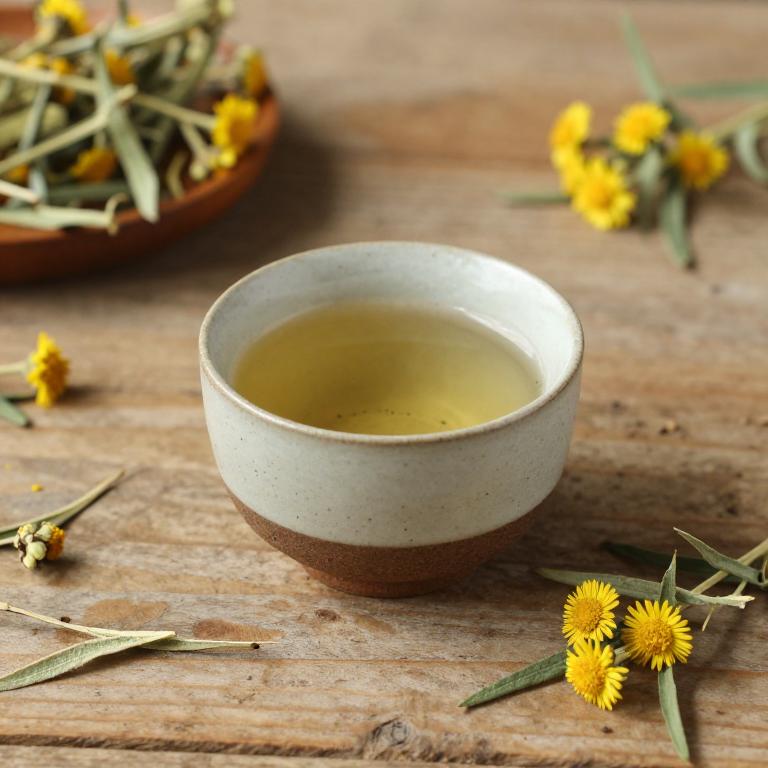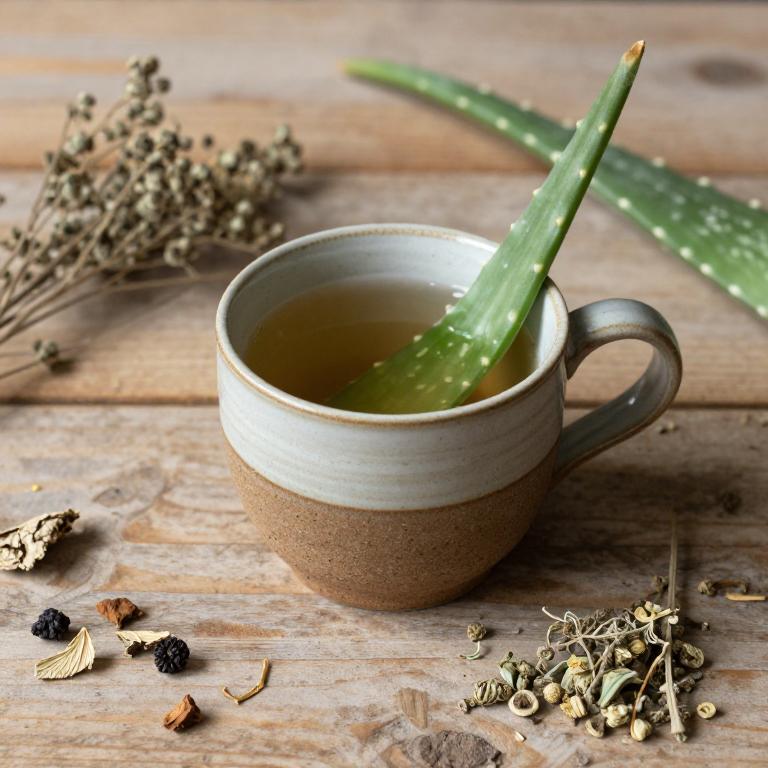10 Best Herbal Teas For Jaundice

Herbal teas have been traditionally used to support liver function and aid in the treatment of jaundice, a condition characterized by yellowing of the skin and eyes due to elevated bilirubin levels.
Certain herbs such as dandelion, milk thistle, and nettle are believed to promote detoxification and improve bile flow, which can help reduce bilirubin levels in the body. These teas are often recommended as complementary therapies alongside conventional medical treatments, though they should not replace professional medical advice. While some studies suggest potential benefits, more research is needed to fully understand their efficacy and safety.
It is important to consult a healthcare provider before using herbal teas, especially for individuals with pre-existing health conditions or those taking medications.
Table of Contents
- 1. Thistle (Silybum marianum)
- 2. Turmeric (Curcuma longa)
- 3. Licorice (Glycyrrhiza glabra)
- 4. Stinging nettle (Urtica dioica)
- 5. Peppermint (Mentha piperita)
- 6. Chaste tree (Vitex agnus-castus)
- 7. St. john's wort (Hypericum perforatum)
- 8. Sweet wormwood (Artemisia annua)
- 9. Dog rose (Rosa canina)
- 10. Aloe vera (Aloe barbadensis)
1. Thistle (Silybum marianum)

Silybum marianum, also known as milk thistle, is a herbal remedy that has been traditionally used to support liver health.
Its active compound, silymarin, is believed to have antioxidant and anti-inflammatory properties that may help protect liver cells from damage. Herbal teas made from silybum marianum are often recommended for individuals with jaundice, as they may aid in detoxification and improve bile flow. However, it is important to consult a healthcare professional before using milk thistle tea, especially for those with existing liver conditions or who are taking medications.
While some studies suggest potential benefits, more research is needed to fully understand its effectiveness in treating jaundice.
2. Turmeric (Curcuma longa)

Curcuma longa, commonly known as turmeric, is widely used in herbal teas to support liver health and aid in the treatment of jaundice.
The active compound in turmeric, curcumin, possesses potent anti-inflammatory and antioxidant properties that may help reduce liver inflammation and improve bile flow. Herbal teas made from turmeric are often combined with other herbs like ginger or milk thistle to enhance their therapeutic effects. These teas are believed to promote detoxification and support the liver's ability to process bilirubin, a key factor in jaundice.
However, while some studies suggest potential benefits, it is important to consult a healthcare professional before using turmeric tea as a treatment for jaundice, as it should not replace conventional medical care.
3. Licorice (Glycyrrhiza glabra)

Glycyrrhiza glabra, commonly known as licorice, has been traditionally used in herbal medicine for its potential liver-protective properties.
Herbal teas made from licorice root are believed to support liver function and may aid in the treatment of jaundice by promoting the detoxification processes in the body. The active compounds in licorice, such as glycyrrhizin, are thought to have anti-inflammatory and antioxidant effects that may help reduce liver inflammation and improve bile flow. However, while some studies suggest licorice may be beneficial for liver health, it is important to consult a healthcare professional before using it for jaundice, as it can have side effects and may interact with certain medications.
Overall, licorice herbal tea is often used as a complementary therapy rather than a standalone treatment for jaundice.
4. Stinging nettle (Urtica dioica)

Urtica dioica, commonly known as stinging nettle, has been traditionally used in herbal medicine for its potential health benefits, including support for liver function.
Some herbal teas made from Urtica dioica are believed to aid in detoxification processes, which may be beneficial for individuals with jaundice, a condition often linked to liver dysfunction. While there is limited scientific evidence directly linking stinging nettle tea to the treatment of jaundice, its high concentration of antioxidants and minerals may contribute to overall liver health. It is important to note that Urtica dioica should not replace conventional medical treatments for jaundice, and individuals should consult with a healthcare professional before using it as a complementary therapy.
As with any herbal remedy, the safety and efficacy of Urtica dioica tea can vary, and it is essential to use it under proper guidance.
5. Peppermint (Mentha piperita)

Mentha piperita, commonly known as peppermint, has been traditionally used in herbal teas to support liver function and aid in the treatment of jaundice.
The essential oils in peppermint leaves, particularly menthol and menthone, are believed to have mild cholagogic properties, which may help stimulate bile production and improve liver detoxification. Peppermint tea is often recommended as a natural remedy to alleviate symptoms associated with jaundice, such as digestive discomfort and sluggishness. However, it is important to note that while peppermint tea may offer supportive benefits, it should not replace professional medical treatment for jaundice, especially in severe cases.
As with any herbal remedy, it is advisable to consult a healthcare provider before using peppermint tea for health conditions like jaundice.
6. Chaste tree (Vitex agnus-castus)

Vitex agnus-castus, commonly known as chaste tree, has been traditionally used in herbal medicine for various health conditions, including jaundice.
While scientific evidence supporting its direct efficacy for jaundice is limited, some studies suggest that its compounds may support liver function and bile production, which are critical in managing jaundice. The herb is believed to influence hormonal balance and may indirectly aid in detoxification processes. However, it is important to consult a healthcare professional before using Vitex agnus-castus for jaundice, as it may interact with medications or be contraindicated in certain conditions.
Herbal teas made from Vitex agnus-castus are often used as complementary therapies, but they should not replace conventional medical treatments for jaundice.
7. St. john's wort (Hypericum perforatum)

Hypericum perforatum, commonly known as St. John's Wort, is traditionally used in herbal teas for its potential hepatoprotective properties.
While it is more widely recognized for its antidepressant effects, some studies suggest that it may support liver function and aid in the detoxification process, which could be beneficial for individuals with jaundice. The active compounds in Hypericum perforatum, such as hypericin and hyperforin, are believed to have antioxidant and anti-inflammatory effects that may help reduce bilirubin levels. However, it is important to note that hypericum perforatum should not be used as a standalone treatment for jaundice without medical supervision, as it can interact with various medications.
Consulting a healthcare professional is essential before incorporating this herbal tea into a treatment plan for jaundice.
8. Sweet wormwood (Artemisia annua)

Artemisia annua, commonly known as sweet wormwood, has been traditionally used in herbal medicine for its potential benefits in treating jaundice, a condition characterized by yellowing of the skin and eyes due to elevated bilirubin levels.
The herb contains a bioactive compound called artemisinin, which has shown hepatoprotective properties that may support liver function and aid in the detoxification process. Herbal teas made from Artemisia annua are believed to promote bile flow and reduce inflammation in the liver, which can help in managing jaundice symptoms. While some studies suggest its efficacy, it is important to consult a healthcare professional before using it as a treatment, especially for severe or persistent cases of jaundice.
Overall, Artemisia annua herbal tea may serve as a complementary therapy in supporting liver health, but it should not replace conventional medical treatments.
9. Dog rose (Rosa canina)

Rosa canina, commonly known as rosehip, has been traditionally used in herbal teas to support liver function and aid in the treatment of jaundice.
The tea is rich in antioxidants, vitamin C, and other bioactive compounds that may help detoxify the liver and improve bile flow. These properties make rosa canina a popular natural remedy for conditions involving impaired liver function, such as jaundice. While it is generally considered safe, it is important to consult a healthcare professional before using it as a treatment, especially for severe cases.
Rosa canina herbal tea can be a complementary therapy when used alongside conventional medical treatments for jaundice.
10. Aloe vera (Aloe barbadensis)

Aloe barbadensis, commonly known as aloe vera, has been traditionally used in herbal teas for its potential health benefits, including support for liver function, which is crucial in managing jaundice.
The active compounds in aloe vera, such as anthraquinones and polysaccharides, may help in detoxifying the liver and promoting bile production, aiding in the reduction of bilirubin levels. While some studies suggest that aloe vera may have hepatoprotective properties, it is important to note that it should not replace conventional medical treatments for jaundice. Herbal teas made from aloe vera are generally considered safe when consumed in moderation, but individuals with liver conditions should consult a healthcare professional before use.
Overall, aloe barbadensis herbal tea may be a complementary remedy for jaundice, though its effectiveness can vary and should be used under proper guidance.